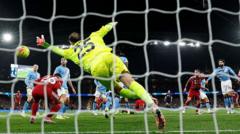Did Webb Justify the Disallowed Liverpool Goal?

Published: 2025-11-11 20:00:09 | Category: sport
The recent disallowance of Virgil van Dijk's goal against Manchester City has sparked considerable debate, particularly regarding the interpretation of offside rules. Referee Howard Webb stated that the decision to disallow the goal for offside was "not unreasonable," citing that Andrew Robertson's actions interfered with goalkeeper Gianluigi Donnarumma's ability to play the ball, despite not directly touching it. Liverpool has since raised concerns about the officiating in this match, asserting that the criteria for offside were not met.
Last updated: 20 October 2023 (BST)
What’s happening now
The disallowed goal has led to significant scrutiny of the officiating standards in the Premier League. Following the match on Sunday, Liverpool reached out to the Professional Game Match Officials (PGMO) to express their concerns. The club believes that the decision-making process surrounding the offside call was flawed and that Van Dijk's goal should have stood. This incident has intensified discussions about the interpretation of the offside rule and its implications for future matches.
Key takeaways
- Virgil van Dijk's goal was disallowed due to perceived offside interference from Andrew Robertson.
- Referee Howard Webb defended the decision, stating it was "not unreasonable."
- Liverpool has formally raised concerns with PGMO regarding the officiating criteria.
Timeline: how we got here
Here is a brief timeline of the key events surrounding the incident:
- 15 October 2023: Liverpool plays Manchester City at Etihad Stadium.
- 38th minute: Van Dijk scores a goal that is later disallowed for offside.
- Post-match: Liverpool contacts PGMO to discuss the officiating of the goal.
What’s new vs what’s known
New today/this week
This week, Howard Webb has publicly addressed the controversy surrounding the disallowed goal, providing insights into the decision-making process of the officials and reinforcing the subjectivity involved in such calls. His comments have reignited discussions about the clarity and consistency of officiating in the Premier League.
What was already established
Before this incident, there had been ongoing debates regarding the application of offside rules, particularly in cases of 'interfering with an opponent'. The guidelines have often led to differing interpretations, contributing to a perception of inconsistency in officiating standards.
Impact for the UK
Consumers and households
For the average football fan, such decisions can influence viewing experiences and perceptions of fairness in the sport. Disallowed goals like Van Dijk's can affect not just match outcomes but also the overall narrative of a season, potentially impacting ticket sales and merchandise associated with teams.
Businesses and jobs
The decision could have implications for bookmakers and sports media, who thrive on the outcomes of matches. A controversial call can lead to increased scrutiny and potentially impact betting patterns and viewer engagement. Moreover, clubs may face financial repercussions from the narrative surrounding such decisions.
Policy and regulation
This incident has highlighted the need for clearer guidelines and training for referees and officials in the Premier League. With Liverpool's formal complaint to PGMO, there may be calls for a review of offside criteria and VAR protocols to reduce subjectivity and enhance the consistency of officiating.
Numbers that matter
- 3-0: Final score of the match, with Manchester City winning after the disallowed goal.
- 38: Minute when Van Dijk's goal was scored and subsequently disallowed.
- 1: Formal complaint submitted by Liverpool to PGMO regarding the officiating.
Definitions and jargon buster
- PGMO: Professional Game Match Officials - the organisation that oversees refereeing in English football.
- VAR: Video Assistant Referee - a technology used to assist referees in making decisions during matches.
- Offside: A rule violation that occurs when an attacking player is positioned closer to the opponent's goal line than both the ball and the second-last opponent when the ball is played to them.
How to think about the next steps
Near term (0–4 weeks)
In the coming weeks, Liverpool's complaint may prompt discussions within PGMO regarding the need for clearer directives on offside calls. Fans and analysts will closely watch how this situation evolves and if it influences officiating standards.
Medium term (1–6 months)
As the season progresses, the implications of this incident may extend into broader discussions about VAR's role in the Premier League, including potential reviews of its protocols and the training of officials to ensure consistency in decision-making.
Signals to watch
- Decisions made in upcoming matches involving controversial offside calls.
- Any changes announced by PGMO regarding officiating guidelines or VAR procedures.
- Reactions from other clubs and players regarding officiating standards in light of this incident.
Practical guidance
Do
- Stay informed about changes in officiating rules and VAR protocols as they develop.
- Engage with discussions around officiating standards to understand their implications for future matches.
Don’t
- Don’t assume all controversial calls will be reviewed or changed; the subjectivity of officiating remains a significant challenge.
- Don’t dismiss the impact of offside calls on match outcomes and team performances.
Checklist
- Understand the key rules surrounding offside and how they are applied in matches.
- Follow updates from PGMO regarding officiating guidelines and VAR use.
- Be aware of how decisions can affect team standings and financial implications.
Risks, caveats, and uncertainties
As the situation unfolds, there are several uncertainties regarding how Liverpool's complaint will be addressed by PGMO. The subjectivity of offside calls means that differing opinions will continue to exist among fans, analysts, and officials. Additionally, any changes to VAR protocols or officiating guidelines could take time to implement, leaving room for ongoing debate.
Bottom line
The disallowed goal by Virgil van Dijk has brought to light significant discussions about officiating standards in the Premier League. With Liverpool's formal concerns now on the table, it is likely that there will be a push for greater clarity in the interpretation of the offside rule and VAR's role in decision-making. Fans will need to remain engaged as this situation develops, impacting the overall narrative of the season.
FAQs
Why was Van Dijk's goal disallowed?
Virgil van Dijk's goal was disallowed due to offside interference from Andrew Robertson, who ducked under the ball, potentially affecting goalkeeper Gianluigi Donnarumma's ability to save it.
What is the role of VAR in this decision?
The Video Assistant Referee (VAR) reviewed the incident but supported the on-field call, determining that the decision was not "clearly and obviously wrong."
What are Liverpool's next steps following this incident?
Liverpool has raised formal concerns to PGMO regarding the officiating standards and may advocate for a review of the offside criteria and VAR protocols in the Premier League.



